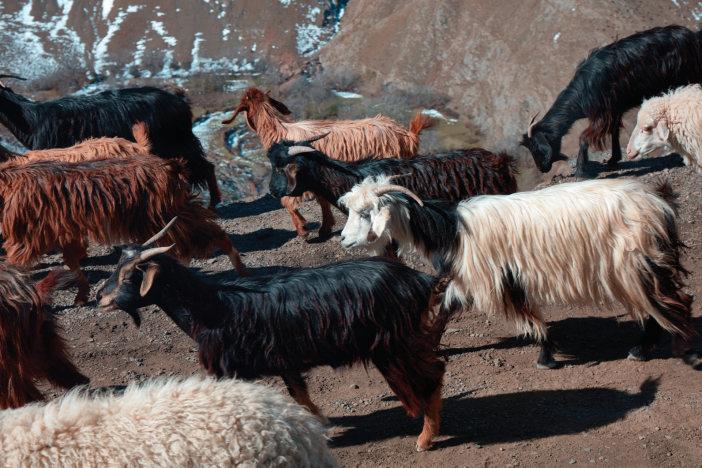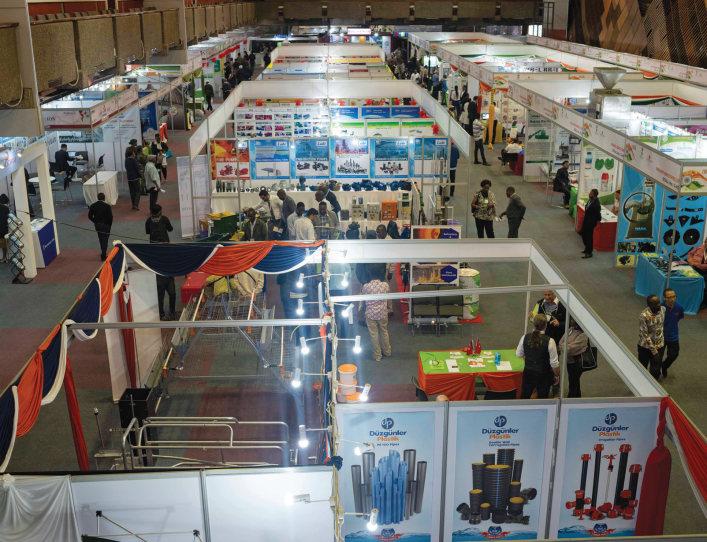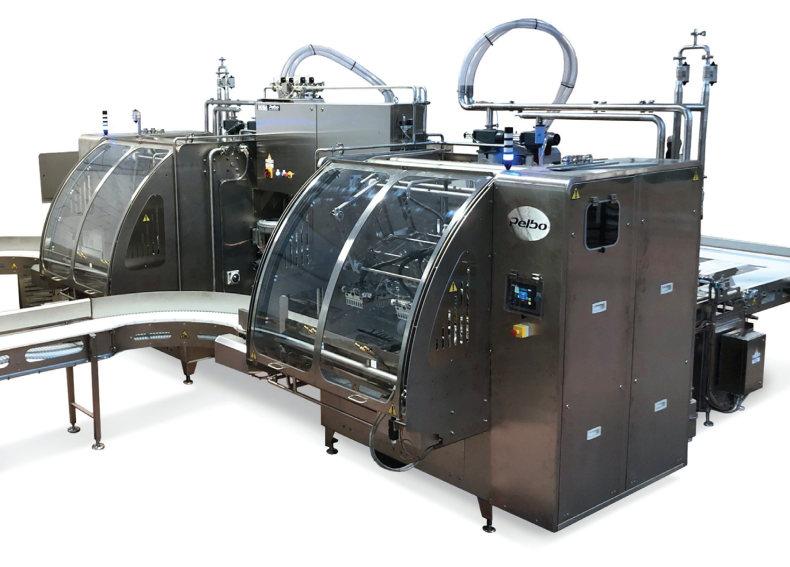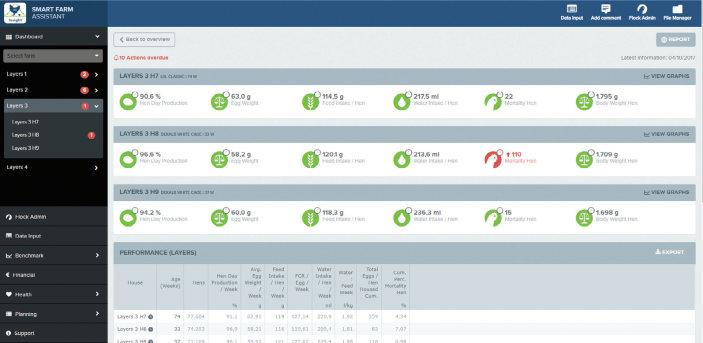
12 minute read
Contents
Farming Calendar 2021
APRIL
07-09 FOODAGRO Africa www.expogr.com/tanzania/food expo/
15-17 Agritech Expo Zambia www.agritech-expo.com
MAY
DAR ES SALAAM
CHISAMBA
27-29 IDMA AND VICTAM EMEA https://idmavictam.com/
JUNE 07-09 Eurotier Middle east www.eurotiermiddleeast.com
ISTANBUL
ABU DHABI
16-18 Agritec Africa www.agritecafrica.com/
JULY
NAIROBI
06-08 agrofood & plastprintpack Nigeria www.agrofood-nigeria.com/
Readers should verify dates and location with sponsoring organisations, as this information is sometimes subject to change.
LAGOS
AfDB and Central African Republic sign MoU for food security
THE CENTRAL AFRICAN Republic and the African Development Bank (AfDB) have signed two MoUs to fight against food insecurity in two prefectures in the centre-north of the country and finance the modernisation of Bangui airport.
The Central African minister of economy, planning and cooperation, Félix Molou, and the country manager of AfDB, Mamady Souaré, initialed the protocols, which relate, on the one hand, to the project of support for the modernisation of the Bangui-Mpoko international airport, phase II (PAMAB II) and, on the other, to support resilience as well as food and nutritional security in the prefectures of Kemo and Ouaka (PARSANKO).
PAMAB II, funded to the tune of US$11.44mn aims to consolidate the role of air transport in serving the Central African Republic through secure, safe, efficient airport services and quality, in accordance with international standards. This second phase completes PAMAB I and the Support Project for the National Civil Aviation Authority.
The realisation of PARSANKO aims to support agro-pastoral production and community initiatives. For crop production, priority will be given to the maize, cassava, peanuts and paddy rice sectors. The focus will be on poultry, pork, goats and sheep for animal production.
Developing resilience and sustainable energy in the Sahel region
THE SAHEL ALLIANCE organised its second general assembly in N'Djamena, Chad on 15 February 2021. The meeting took place on the side-lines of a summit for the G5 Sahel countries— Burkina Faso, Mali, Mauritania, Niger, Chad—as well as France. The African Development Bank (AfDB) played an active role in the formation in July 2017 of the Alliance, an international cooperation platform to spur development and stability in the Sahel region.
To foster closer synergy with development partners, the Sahel Alliance has invited the AfDB to lead a working group on agriculture, rural development and food security.
The Bank's extensive experience in the Sahel region in the management and control of water, agri-pastoral and fisheries development, as well as the sustainable management of natural resources, attracted it to the Sahel Alliance.
The Bank’s current Sahel portfolio includes three crucial projects aimed at strengthening the resilience of ecosystems and populations and ensuring food security through investment in agriculture and livestock farming as well as sustainable management of natural resources.
The Bank’s flagship Desert to Power solar initiative, valued at US$20bn will turn the Sahel region into the world’s largest solar zone giant solar zone with up to 10,000MW of solar generation capacity. Eleven countries are beneficiaries of this initiative including Burkina Faso, Ethiopia, Eritrea, Djibouti, Mali, Mauritania, Niger, Nigeria, Senegal, Sudan and Chad.
P2RS, which is mobilising more than US$250mn for its first phase and US$750mn over 20 years, is contributing immensely to breaking the cycles of famine in the region. It also promotes the development of rural infrastructure and creates thousands of jobs for rural youth through the development of regional value chains and markets.
Another project that demonstrates the Bank's commitment to the region’s development is the ongoing implementation of the Programme for the Rehabilitation and Strengthening of the Resilience of Socio-Economic Systems in the Lake Chad Basin (PRESIBALT), which covers Niger, Chad, Cameroon, Central African Republic and Nigeria.
The aim is to ensure food security through investment in agriculture and livestock farming.
IFC loans CEDIAM to support Mali’s mango sector
IFC, A MEMBER of the World Bank Group, has announced the recent disbursement of a loan to support expansion at Mali's leading mango processor, Centre d'Étude et de Développement Industriel et Agricole du Mali (CEDIAM), helping the company increase farmers’ access to markets and boost production and exports of the flavourful fruit.
IFC’s loan will help CEDIAM complete upgrades to its production facility, purchase the equipment it needs to increase the number of mangoes it collects, and add up to 1,000 smallholder mango farmers to its already 2000-strong farmer supply chain. The funding will also support 300 direct and indirect jobs at CEDIAM.
The funds, which will also provide working capital for CEDIAM, are expected to boost the company’s exports of mango puree and concentrate in Europe and other markets. IFC will also provide CEDIAM with advisory services to help it strengthen its corporate governance, and financial management, and environmental, and social risk management practices.
Farmers will be supported directly with training to improve their agricultural methods, not only in mango farming, but also in intercropping other varieties to boost their incomes. The advisory services support is co-funded by the Global Agriculture and Food Security Programme (GAFSP).
“This partnership will help our company become more modern, sustainable, and profitable. It will positively impact local mango production and transformation in Mali and benefit all stakeholders in this value chain. It will also improve our corporate capacity and allow us to meet international market standards,” said Diadié Sankaré, CEDIAM’s chairman.
“IFC’s partnership with CEDIAM will create jobs and strengthen Mali’s important agriculture sector, which contributes significantly to the country’s employment and GDP. The project also highlights how IFC and the World Bank are working together to support the resilience of job-creating, private sector companies in the Sahel region particularly during severe market challenges brought by COVID-19,” said Aliou Maiga, IFC’s director for West and Central Africa.
IFC’s investment is part of the World BankIFC joint implementation plan for agribusiness in Mali, which supports partnerships between smallholder farmers and agribusiness players. The World Bank-funded projects, through the Mali Support to AgroIndustrial Competitiveness Project (PACAM), aim to address infrastructure challenges by rehabilitating rural roads and building collection facilities.
The US$30mn PACAM programme has already rehabilitated 300km of rural roads in fruit production areas in Mali and conducted campaigns to improve the quality of mangos for export.
“Expanding CEDIAM and increasing the competitiveness of Mali's mangoes internationally will create more opportunities and revenues for Malian farmers, one way that the World Bank Group is working to create markets and strengthen local rural economies in the country,” said Soukeyna Kane, World Bank country director for Mali.
IFC’s investment benefited from on-theground support and flexible funding from IFC’s Fragile and Conflict-affected Situations Africa Unit and its Conflict Affected States in Africa initiative, supported by Ireland, the Netherlands and Norway.

Algenex and Virbac enter licensing agreement for insect-based vaccine
ALGENEX SL AND animal health company Virbac have entered into an international licensing agreement for the development and commercialisation of a CrisBio-based vaccine.
The vaccine will be developed jointly and manufactured using CrisBio, Algenex’s proprietary and patent-protected Baculovirus vector-mediated expression platform that harnesses the power of insects to act as natural single-use bioreactors.
CrisBio represents a new paradigm in biologics production, offering a quick, linearly scalable solution to meet the global demand for recombinant protein production without significant capex investment. Algenex anticipates receiving European approval of the first veterinary vaccine produced using CrisBio in 2021.
“This new collaboration with Virbac, one of the global leaders in animal health, is another important milestone for Algenex and a further validation of our unique CrisBio technology and its potential to transform vaccine production in major indications across animal health,” said Claudia Jiménez, CEO of Algenex.
“With this partnership, we will benefit from the experience of Algenex, and by providing a simple, scalable and cost-effective alternative to current bioreactor-based expression technologies on the market, we should be able to increase our footprint in the farm animals’ vaccine market,” said Sébastien Huron, CEO, Virbac group.
Algenex SL is a VC-backed biotechnology company delivering disruptive technologies for recombinant biologics production.
AfDB, FAO and South Sudan’s government partner to boost agricultural markets
THE AFRICAN DEVELOPMENT Bank (AfDB) has signed protocols to disburse a US$14mn grant to the government of South Sudan to boost agricultural markets in a project to be implemented by the UN’s Food and Agriculture Organization (FAO).
The Agricultural Markets, Value Addition and Trade Development (AMVAT) project aims to enhance agricultural productivity and boost the marketing and trade of agricultural products in South Sudan. The project will be implemented by the Food and Agriculture Organization of the United Nations (FAO) in close liaison with the Ministry of Agriculture and Food Security.
The five-year project will help increase the productivity and incomes of almost 20,000 farming families in Central and Eastern Equatoria and Jonglei states, most of whom are formerly internally displaced persons who have now returned to their homes.
The project will create
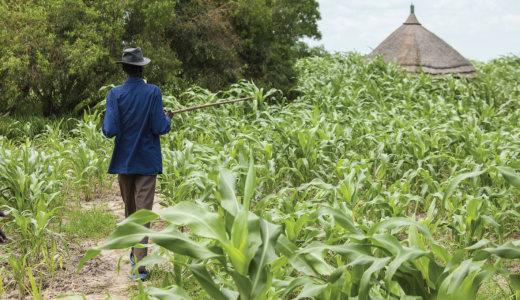
The project will create aggregation business opportunities for farmers and traders.
Image Credit: Adobe Stock
aggregation business opportunities for farmers and traders, including women and youth, and provide them with new skills and the agro-processing equipment they need to produce competitive products. Twenty aggregation business centres will serve as ‘one-stop shops’ where farmers can access extension services and connect to markets for their value-added products. Farmer groups joining the aggregation centres will have their products not only tested and quality certified, but also traded with the private sector on their behalf.
“A diversified economy away from oil and long-term growth depends on promoting agribusiness development,” said Athian Ding Athian, South Sudan’s Minister of Finance and Planning at the signing ceremony, thanking the African Development Bank for its growing assistance. “With support from our partners, we are building an improved marketing and trade environment for agribusinesses, increasing people’s incomes and creating new jobs, particularly for the youth.”
The bank’s country manager for South Sudan, Benedict Kanu, noted, “A key factor explaining Africa’s and indeed South Sudan’s low level of agricultural value addition is the inefficient marketing infrastructure. This prevents farmers and processors from realising the full value of their produce, even in their raw form.”
South Sudan has considerable unrealised agricultural potential, but the effects of continued violence combined with unprecedented flooding have seriously damaged food production, resulting in a huge food import bill.
“Thanks to this generous contribution from the African Development Bank, farmers will move faster from subsistence to commercial agriculture by having access to new technologies, markets and linkages with other services and actors,” said Meshack Malo, FAO representative in South Sudan.
VTR Bio-Tech plans further expansion and distribution in Africa
VTR BIO-TECH, A bio-technological enterprise offering feed additive bioengineering products and technical services for poultry, swine, ruminant and aquaculture sectors, plans to further develop the African market and look for distributors in African countries.
Found in 1991, VTR has gradually developed into a bio-enzyme preparation giant in the industry in China. Now it has 19 holding and subsidiary companies, one national enterprise technology centre, one work station of postdoctoral scientific researchers, one group research institute, three scientific research centres, five biological R&D engineering centres, 15 production bases.
VTR’s core technologies in biotechnology include gene engineering, liquid fermentation, solid fermentation, compound enzyme collaboration, preparation formulation and application of feed enzyme, and steroid hormone synthetic technique lay solid foundation for its rapid growth and continuous development.
With headquarters in Zhuhai, Guangdong, VTR has set up 25 direct-selling service branches offices, and has established sales network in more than 60 countries and regions in Asia, Europe, America and Africa. It has built up a long-term stable partnership with more than 2,300 quality direct customers from home and abroad. Being customer oriented, VTR will create maximum economic and social benefit for customers and society through investing heavily in innovations, absorbing the latest research achievement and integrating them into their products and services.
AgriTech Expo Zambia from 15-17 April
AGRITECH EXPO ZAMBIA will be back at the GART Research Centre in Chisamba, Zambia for the seventh edition of the show from15-17 April 2021.
Presented by the Zambia National Farmers Union (ZNFU) and jointly organised with the Zambian subsidiary of the German Agricultural Society (DLG Agriculture), AgriTech Expo Zambia is the leading international agriculture showcase event in sub-Saharan Africa. With more than 200 exhibitors, international pavilions, exciting feature zones, training workshops and live crop trials, the 2021 edition of AgriTech Expo Zambia is set to be action packed for the small and large-scale farmer alike.
The high level panel discussion will take place on Day 1, the commercial farmer preview day. VIPs, government officials, media partners, top suppliers and commercial farmers at the all-new Bayer Networking Zone will continue the discussions on improving the industry.
DLG Agriculture announced that they have launched the AgriTech eLearning Platform, which offers a digital arena for interactions between farmers, equipment manufacturers and suppliers to be carried out with ease. The AgriTech eLearning platform is open and free to access for all.
Seed producers and agrochemical suppliers will have the opportunity to run live planting and application demonstrations, and there will be machinery and equipment demonstrations, as well. The Aquaculture zone at Agritech 2021, will showcase the latest in fish farming, feeds and methods to ensure thriving business.
The platform allows exhibitors to engage the farmers with their products, services and offerings in advance of the show. The exhibitors can build on the trust they develop using this pre-show interaction with their potential clients when they meet them physically at the trade fair in April 2021. The exhibitors include Agrico, ATS Agrochemicals, NMC, BASF Agricultural Solutions, Lindsay Africa, Syngenta Zambia and many others.
BioAg World Congress 2021: the key global event for biologicals
THE SECOND EDITION of BioAg World Congress 2021 has given a rare opportunity to gain a deeper insight to the industry, with strong agenda, elaborate panels and innovative exhibitors.
The congress, held in a 3D virtual setup, was produced 'by the BioAg industry and for the BioAg industry', allowing face-to-face networking to grow distribution networks and offering the latest technological advances within BioAg.
The BAW 2021 agenda comprised six sessions around four main BioAg segments – biopesticides, biostimulants, biofertilisers, and bionutritionals. The sessions took an in-depth look at industry developments, roles of the food chain to influence biosolution adoption, soil health and water management, challenges and opportunities on regulation, go-to-market, science-backed innovations, investment in bioag, and insight into growth areas such as precision AgTech.
Biologicals (Biopesticides, Biostimulants, Biofertilisers, and ICM/IPM) are crucial tools needed for farmers across the globe. Europe is the largest market, followed by North America. Latin America is the fastest growing and Asia has huge untapped potential. BioAg industry is relatively new but is growing tremendously and offers great sustainable solutions for agricultural issues. As the industry keeps growing, it faces various challenges such as innovative products, quality assurance, supply chain, consumer awareness and others.
The BioAgro Achiever and BioAgro Disruptor Award of the BioAg World Congress, recognised the efforts and provided inspiration to the human resources in the industry. The exhibition offered the opportunity to network virtually, and interact personally.

